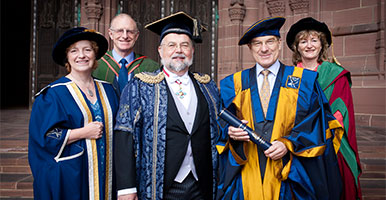Mick Laverty
Presented by Professor Michael Parkinson
This is a truly civic university, firmly rooted in this extraordinary city, and its defining ethos comprises three deceptively simple yet very powerful words: dream, plan, achieve.
Each July during Graduation Week, the University's highest honour – an Honorary Fellowship – is bestowed on a select band of individuals outside the University, in recognition of their outstanding achievement in a given field or profession, and who personify and inspire others to 'dream, plan, and achieve.'
We propose Mick today for his outstanding contribution to regeneration in this country. Mick was born in Liverpool in 1964, in the good days. He studied accountancy and finance at Liverpool Polytechnic. He graduated in 1986 during some difficult days for the city.
After leaving the Polytechnic, Mick has had an outstanding career in his chosen field of regeneration.
He worked in local government finance for the first 12 years of his career In London and Warwickshire. But his real love was regeneration. And his career really took off in 1999, when he joined one of the new powerful Regional Development Agencies created by government to regenerate our declining regions.
Mick joined Advantage West Midlands on the day it opened. He was its first Director of Finance and Strategy. After 5 years he was made Deputy Chief Executive. He was appointed to the top job, as Chief Executive in 2007.
Mick led great work in the West Midlands. He helped begin the transformation of its visual and industrial landscape and helped lay the foundations to restore it as a world-class centre of British enterprise. In the last 13 years he has overseen 2,500 projects and programmes. These included a series of enormously significant projects including:
- The £100 million redevelopment of Birmingham New Street railway station
- The renaissance of the iconic Fort Dunlop building next to the M6
- And several science park developments throughout the region
Under his leadership, Advantage West Midlands was the most consistently high-performing English regional development agency. It was given the highest possible rating by the National Audit Office.
Every pound it invested attracted another eight into the regional economy. Mick received personal recognition for services to business and the region, he was awarded the Birmingham Chamber of Commerce President’s Award in 2010. He received the West Midlands Institute of Directors Chairman's Award this year. Mick is tremendously loyal to AWM. He joined the first day it opened. And he stayed to the Agency's final day last week to ensure its work was safely completed.
So that is Mick Laverty the public man, a great success in important field – regeneration. But who is the person behind that public success? And what does his success mean for our graduates and their families who are here today? I asked Mick to reflect on this question.
Four really important messages emerged from his reflections:
- It's important to dream. Our new graduates must really be positive about the future. We all know that times are tough today. Getting jobs isn't easy. They were just as tough when Mick started in 1986. But he still made it. His advice is that markets go up as well as down. There will be opportunities to use your talents and your qualifications if you work hard to make your own luck. So be brave in challenging times and you will be rewarded!
- A second thread running through Mick's career is the crucial importance of education and universities in particular. Mick is most proud, not of the great buildings he helped create, but of the work he did in creating powerful links between the universities and all the small firms in his region. This included the relatively small bursaries he gave to small firms which helped to forge links between them and the expertise in the region's universities. I know he valued working with our own Vice-Chancellor when they collaborated on developing science and technology transfer projects in Birmingham. Mick knows that universities are the keys to creating successful places as well as successful people and he has tried hard to engage with them. So this is another reason why this University with its powerful civic links is so pleased to honour Mick today. His work underlines this University's commitment to help create economic opportunity for all the people of Liverpool.
- There is a third message from Mick's career, it is about the nature of success. Mick has been successful and he understands how to run a very successful organisation. And he found that in his own organisation people's success was determined not by the age or the status of the university they attended. There was no institutional passport to success. Rather it was the willingness of people to use their education that had nourished their natural talents. It was their energy, enthusiasm and commitment that led to success for them – and for the people they worked for and with. So there are no artificial limits for today's graduates who are willing to apply what they have learned at Liverpool John Moores University.
- I think the final message from Mick's career is the importance of the city of Liverpool itself. Mick was born in Liverpool. He was educated in Liverpool. To forge his career he left Liverpool. But Liverpool never really left him. It was Mick's concerns about the troubles affecting Liverpool, and other Great British cities, in the 1980s that led him into the regeneration industry. He wanted to do something to stop their decline. More positively he wanted to help to put them back in their rightful role as the engines of our national economy. And he did just that. Liverpool was an inspiration for him to do his great work in regeneration in another city. I know he's delighted as we are to see the fantastic renaissance there has been in Liverpool since the difficult days when he left in the 1980s. This city is now really one he, and we today, can be proud of.
So may the city of Liverpool, its achievements and its great qualities inspire our new graduates today as they set off on their chosen paths just as it inspired Mick. And may they live up to its aspirations as fully and achieve, and contribute, as much as Mick has.
So it is entirely fitting that Mick should come home today, to receive this Honorary Fellowship for his significant achievements, from the University from which he graduated, in this, his home city.
Thus, it is with great pleasure that I present Mick Laverty, this most distinguished son of our city, for admission to our highest honour, as an Honorary Fellow of Liverpool John Moores University.



